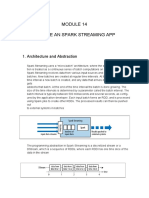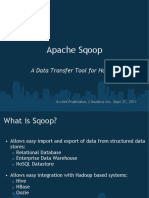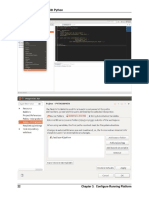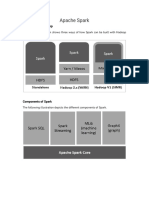// scalastyle:off println
package org.apache.spark.examples.streaming
import org.apache.spark.streaming.{Seconds, StreamingContext}
import org.apache.spark.SparkContext._
import org.apache.spark.streaming.twitter._
import org.apache.spark.SparkConf
/**
* Calculates popular hashtags (topics) over sliding 10 and 60 second windows from a Twitter
* stream. The stream is instantiated with credentials and optionally filters supplied by the
* command line arguments.
* Run this on your local machine as
*/
object TwitterPopularTags {
def main(args: Array[String]) {
if (args.length < 4) {
System.err.println("Usage: TwitterPopularTags <consumer key> <consumer secret> " +
"<access token> <access token secret> [<filters>]")
System.exit(1)
StreamingExamples.setStreamingLogLevels()
�val Array(consumerKey, consumerSecret, accessToken, accessTokenSecret) = args.take(4)
val filters = args.takeRight(args.length - 4)
// Set the system properties so that Twitter4j library used by twitter stream
// can use them to generat OAuth credentials
System.setProperty("twitter4j.oauth.consumerKey", consumerKey)
System.setProperty("twitter4j.oauth.consumerSecret", consumerSecret)
System.setProperty("twitter4j.oauth.accessToken", accessToken)
System.setProperty("twitter4j.oauth.accessTokenSecret", accessTokenSecret)
val sparkConf = new SparkConf().setAppName("TwitterPopularTags")
val ssc = new StreamingContext(sparkConf, Seconds(2))
val stream = TwitterUtils.createStream(ssc, None, filters)
val hashTags = stream.flatMap(status => status.getText.split(" ").filter(_.startsWith("#")))
val topCounts60 = hashTags.map((_, 1)).reduceByKeyAndWindow(_ + _, Seconds(60))
.map{case (topic, count) => (count, topic)}
.transform(_.sortByKey(false))
val topCounts10 = hashTags.map((_, 1)).reduceByKeyAndWindow(_ + _, Seconds(10))
.map{case (topic, count) => (count, topic)}
.transform(_.sortByKey(false))
� // Print popular hashtags
topCounts60.foreachRDD(rdd => {
val topList = rdd.take(10)
println("\nPopular topics in last 60 seconds (%s total):".format(rdd.count()))
topList.foreach{case (count, tag) => println("%s (%s tweets)".format(tag, count))}
})
topCounts10.foreachRDD(rdd => {
val topList = rdd.take(10)
println("\nPopular topics in last 10 seconds (%s total):".format(rdd.count()))
topList.foreach{case (count, tag) => println("%s (%s tweets)".format(tag, count))}
})
ssc.start()
ssc.awaitTermination()
// scalastyle:on println
package org.apache.spark.examples.streaming
import org.apache.log4j.{Level, Logger}
import org.apache.spark.Logging
�/** Utility functions for Spark Streaming examples. */
object StreamingExamples extends Logging {
/** Set reasonable logging levels for streaming if the user has not configured log4j. */
def setStreamingLogLevels() {
val log4jInitialized = Logger.getRootLogger.getAllAppenders.hasMoreElements
if (!log4jInitialized) {
// We first log something to initialize Spark's default logging, then we override the
// logging level.
logInfo("Setting log level to [WARN] for streaming example." +
" To override add a custom log4j.properties to the classpath.")
Logger.getRootLogger.setLevel(Level.WARN)

























































































